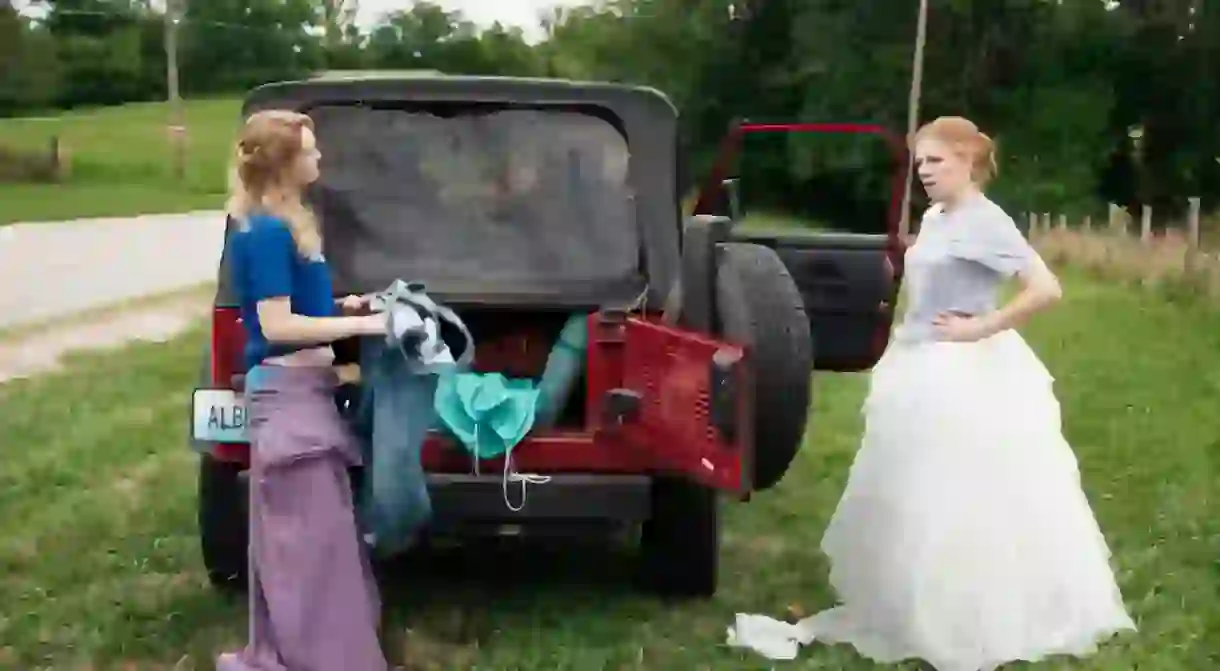When Your Pain-in-the-Ass Sister Is Your Best Friend Forever

Morgan Dameron’s infectious road movie Different Flowers—about antagonistic sisters bonding anew—is one of the comedy delights of the year. Emma Bell’s uptight Millie is about to marry a man she no longer loves when her wild younger sib Emma, played by Hope Lauren, says, effectively, “Let’s get the hell away from this chapel and drive away in my Jeep.” And off they go into rural Kansas and Missouri. We asked Bell and Lauren what the movie’s really about.
Culture Trip: Watching Different Flowers, I got the feeling you two had known each other all your lives. Did you become like sisters when you were making the film?
Hope Lauren: I guess I shouldn’t speak for both of us, but I feel like that really happened naturally, and I think that you did too, Emma?
Emma Bell: Oh, yeah. It was kind of crazy. We immediately fell into this sister-sister bond. We didn’t audition together but met each other at the read-through and it was instantaneous. Hope is one of the most charming people I’ve ever met in my life. I’m not just saying that because she’s here now. She is incredibly empathetic.

HL: I liked watching Emma on set—so professional and yet so kind to everybody. She felt very much like a big sister I was looking up to and trying to mirror.
CT: After working through some old grievances, each sister starts to change. Millie loosens up, Emma thinks about settling for a while. What are your thoughts about that?
HL: Because this is a movie about the relationship between sisters, I think their changes have to come from each other. If you put two people who love each other—but who don’t usually get along—in the same place for enough days, they will boil together, and they’ll start to admire and learn from each other. My character Emma’s changes come from watching Millie be vulnerable yet brave and self-possessed. They give each other strength.

EB: I love the way you just put that. I think Millie was living a life she thought everyone wanted her to live. She was the classic first child, an A-type perfectionist who stays in the family and gets married to her high-school sweetheart. All those things are lovely if they resonate, but they didn’t resonate for her and she wanted something different—something outside the box. I think she garners the strength and courage to do that from Emma, because Emma is, for better or worse, totally herself all the time.
That probably rubs Millie the wrong way in other instances, like, “How come my baby sister gets to do whatever she wants and doesn’t have consequences? Whereas I feel like I’m constantly put on this pedestal that I can’t possibly maintain.” On the other hand, Millie thinks, “Heck yeah. If Emma is able to be exactly who she is all the time, why can’t I be who I am?” She gets inspiration from her sister’s uninhibitedness and allows herself to go in a similar direction, At the end of the day, it matters more how you feel about yourself than what your community feels about you.

CT: Hope, do you think that when Emma coaxes Millie out of the wedding that she’s got an agenda?
HL: That’s a good question. I felt in my head that Emma is almost always trying her best. She’s not very apologetic—I mean, she thinks she’s considerate of other people, but she’s definitely not. She thinks if something’s going to be fun right now that she should do it, but she grows out of that toward the middle and end of the film.
I’ve got three sisters and I’ve had moments with them when I’ve said, “Can’t you just, like, live a little?” Emma has that with Millie. She thinks, “You’re so perfect. Can’t you just mess up a little bit?” And she’s intuitive enough to pick up on Millie’s feelings of not wanting to get married. I don’t think Emma thinks it through. She acts from her guts. That can cause havoc along the way, but she’s giving her sister an opportunity by saying, “I don’t think you want to do this, and I have a jeep, so we can leave.” I don’t necessarily think Emma wants anything from Millie in that moment. She’s just being the sister.

CT: I like how this movie is about women not defining themselves in terms of men.
EB: That’s what drew me to the script from the very beginning to be honest. Reading it, I was like, “Oh, this is a cutesy comedy about two girls,” but when you get into the heart of it, it says a lot of things. You’ve got these two women who are very self-possessed, yet they’re polar opposites. They make all their decisions from their core, from what they want. For Millie it’s: “I need to get out of this town. I need to get out of this life. I need to risk everything.”
Dumping the guy you’ve been with forever and making a lot of people in your community very upset is a big deal, but she has this desire to be something more. That’s a really brave notion. Even though it’s 2017, I still think there’s a lot of women out there who don’t feel like they can really follow that choice.
Then on the total opposite side, you have Emma, who has always lived by the tune of her clock and is learning that maybe it would be nice if she could be more considerate of people and share a little bit more with a partner.
They’re both beautiful examples of possible choices for any person. I think making two female leads the focus of those choices is really empowering.













